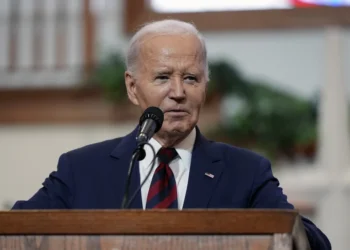WHAT’S HAPPENING TODAY: Good afternoon and happy Thursday, readers! We are inching closer to the three-day Memorial Day holiday weekend – just a reminder that there will be no edition of Daily on Energy sent out on Monday.
With a little help from our editor Joe Lawler, today’s Daily on Energy dives right into the mega tax cut and spending bill passed by the House early this morning. The final bill looks a little different than what had been proposed, with notable changes to when Biden-era clean energy tax credits end.
The Trump administration has been accused of breaking the law by withholding congressionally obligated funds from an electric vehicle infrastructure grant fund. Keep reading to find out how many hurricanes national forecasters are predicting for this season.
Welcome to Daily on Energy, written by Washington Examiner energy and environment writers Callie Patteson (@CalliePatteson) and Maydeen Merino (@MaydeenMerino). Email cpatteson@washingtonexaminer dot com or mmerino@washingtonexaminer dot com for tips, suggestions, calendar items, and anything else. If a friend sent this to you and you’d like to sign up, click here. If signing up doesn’t work, shoot us an email, and we’ll add you to our list.
HOUSE GOP MEGABILL ACCELERATES CLEAN ENERGY CUTS: As part of their major tax cut and spending bill passed early this morning, House Republicans approved a faster phase-out of Inflation Reduction Act clean energy tax credits.
The details: The crackdown on green subsidies created or expanded through the IRA, which was passed by Democrats and signed by former President Joe Biden, came as part of the revised reconciliation bill, the text of which wasn’t released until late last night.
Several conservatives, including Texas Rep. Chip Roy, had called on House leadership to include complete repeal of the clean tax credits after criticizing the Ways and Means Committee proposal to begin phasing out the credits in 2029.
Although some in the party objected to the clean energy cuts included in the original version of the bill, the final version included steeper cuts. The revisions specifically end technology-neutral tax credits for all projects unless they are able to start construction within 60 days of the bill’s enactment and are placed in service by the end of 2028. The bill also denies subsidies for expenditures for certain wind and solar leasing arrangements.
Nuclear sees some relief: Centrists saw one small win in the revised bill for nuclear energy, which was facing strict phase-outs of related subsidies by 2031 — a timeline nuclear advocates said would threaten new domestic buildout. Nuclear developers are still subject to the updated 2028 phaseout timeline, but they will be eligible for the credit if they have only started construction by that date and are not yet in operation. The bill would also extend a tax credit for existing nuclear reactors until 2031, two years later than House Republicans previously proposed, and would only allow transferability for nuclear energy.
Read more from Callie here.
Something related: Shortly after the bill was passed in the House this morning, stocks for renewable energy companies quickly began to feel the pressure. Sunrun, the largest rooftop-solar company in the U.S., saw its shares drop by around 42%, according to Bloomberg. Similarly, solar companies SolarEdge Technologies and Enphase Energy saw their shares tumble by 27% and 20% respectively.
CONGRESS VOTES TO UNDO CALIFORNIA EMISSIONS STANDARDS, DEFYING SENATE PARLIAMENTARIAN: The Senate voted this morning to strip California of its ability to set strict vehicle emissions standards aimed at phasing out gas-powered cars, circumventing the chamber’s parliamentarian to send the measure to President Donald Trump’s desk.
The details: In a 51-44 vote, the Senate voted to cancel waivers granted to California by the Environmental Protection Agency that gave the state its ability to set regulations that ban the sale of gas-powered vehicles by 2035, which critics have likened to an electric vehicle mandate.
Lawmakers also moved to cancel EPA waivers that allowed California to set strict emissions rules on heavy-duty vehicle manufacturers in a 51-45 vote, as well as regulations aimed at reducing nitrogen oxide emissions from heavy-duty vehicles in a 49-46 vote.
The votes have significant ramifications for the country. A dozen states follow California, which has an exemption that allows it to set its own rules under the Clean Air Act and implement regulations that will ban the sale of gas-powered cars after 2035. Trump campaigned hard against rules that favor EVs, and Republicans have argued that California rules limit consumer choice nationwide.
Procedural drama: As in the House, Senate Republicans repealed the waivers using the Congressional Review Act, a legislative process that allows the majority to bypass a filibuster and vote in a simple majority to undo a regulation.
While Republicans have used their process frequently over the last few months to undo numerous Biden-era energy regulations, today’s votes directly challenged a finding from the Government Accountability Office. In April, the Senate parliamentarian ruled that the waivers issued to California were not considered agency rules, and therefore not subject to the CRA.
Senate Majority Leader John Thune has insisted the opposite, forcing a vote late last night where Republicans affirmed their ability to repeal the waivers.
Read more from Callie here.
TRUMP BROKE LAW BY NIXING ELECTRIC VEHICLE CHARGING FUNDS, GAO FINDS: The Government Accountability Office said today that the Trump administration ran afoul of the Impoundment Control Act when it withheld funds for the National Electric Vehicle Infrastructure (NEVI) Formula Program.
The details: In February, the Federal Highway Administration issued a memo rescinding all state plans for the program and halting expenditures.
The GAO, though, said that the administration was required to obligate the funds under the 2021 Bipartisan Infrastructure Law, and that it was in violation of the ICA by withholding funds.
Reaction: “This GAO decision confirms that the Trump Administration broke the law when it blocked funding that Congress had already approved,” House Budget Committee ranking Democrat Rep. Brendan Boyle said in a statement. “That money was supposed to build and maintain a nationwide EV charging network.”
NOAA WARNS OF AN ABOVE-NORMAL HURRICANE SEASON: The start of Hurricane Season is less than two weeks away, and national forecasters are warning that it will likely be an unusually heavy season.
The details: Forecasters with the National Oceanic and Atmospheric Administration predicted today that there is a 60% chance the U.S. will see an above-normal season with as many as 19 named storms. Up to 10 of those are forecast to become hurricanes, including 3-5 that could be major hurricanes with winds reaching 111 mph or higher.
The agency said that the unusually heavy season can be attributed to a number of factors, including warmer than average ocean temperatures, weak wind shear, and higher activity from the West African Monsoon.
Key quote: “In my 30 years at the National Weather Service, we’ve never had more advanced models and warning systems in place to monitor the weather,” NOAA’s National Weather Service Director Ken Graham said in a statement. “This outlook is a call to action: be prepared. Take proactive steps now to make a plan and gather supplies to ensure you’re ready before a storm threatens.”
GEOTHERMAL COULD SUPPLY 10% of U.S. ELECTRICITY DEMAND, USGS SAYS: The U.S. Geological Survey said in a study released today that geothermal energy harnessed in the Great Basin of Nevada and surrounding states could produce enough energy to meet at least 10% of current electricity demand.
Geothermal energy currently generates less than 1% of the country’s supply. But that could change if the U.S. utilized enhanced geothermal systems in the Great Basin, using fracking technology to pump water into impermeable rock to extract heat. USGS estimates that there are 135 gigawatts of electricity power generation capacity available from the upper 6 kilometers (3.7 miles) of the Earth’s crust in the region.
“USGS assessments of energy resources are about the future. We focus on undiscovered resources that have yet to be fully explored, let alone developed,” Sarah Ryker, acting director of the USGS, said in a statement.
EUROPEAN PARLIAMENT BACKS PLANS TO SOFTEN CARBON TARIFF: The European Union’s legislative branch has said it supports changing the bloc’s carbon tariff, exempting most companies from paying the levy under its carbon border adjustment mechanism (CBAM) set to go into effect next year.
The details: The European Parliament overwhelmingly agreed today to change CBAM regulations that require all individuals or companies importing covered goods with a value greater than 150 euros ($170) to pay the tariff, according to Reuters. The new rules would exempt any companies that import less than 50 metric tons annually of its covered goods. This would exempt roughly 90% of importers from the carbon fee.
Members of parliament have insisted that the change will not heavily weaken the tariff’s intended effect, as the remaining 10% of importers are reportedly responsible for over 99% of carbon emissions associated with the rules.
The changes are also backed by the EU’s executive branch, the European Commission. EU member states are now expected to weigh the changes and negotiate the final rules before they can be implemented. EU diplomats, though, indicated to Reuters this week that they are not anticipating much pushback.
OIL DROPS ON REPORT OF ANOTHER OPEC+ OUTPUT HIKE: Oil prices dropped earlier today after Bloomberg reported that OPEC+ members are discussing another output hike in July, potentially up to 411,000 barrels per day, triple the amount previously discussed.
Prices of Brent Crude, the international benchmark, initially fell by well over a dollar on the news, but later recovered to above $64 in the early afternoon, still down 0.9% on the day.
Part of the motivation for a further output hike could be to punish members of the cartel who have been overproducing, such as Kazakhstan and Iraq.
RUNDOWN
Los Angeles Times Conservative billionaire pitches massive gas plant to power data centers
E&E News Trump, who called FEMA ‘slow,’ is making people wait months for help
Inside Climate News Penguin Poop May Help Preserve Antarctic Climate

















